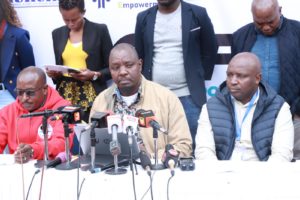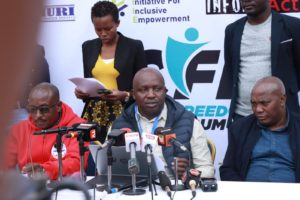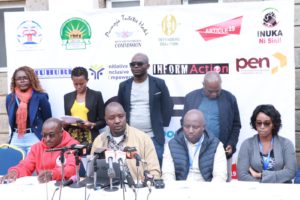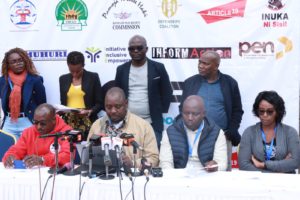FOR IMMEDIATE PRESS RELEASE
CIVIL SOCIETY STATEMENT ON THE STATE OF CIVIC AND DEMOCRATIC SPACE IN KENYA AHEAD OF THE GENERAL ELECTIONS
Civic Freedoms Forum is a national platform composed of civil society organizations (CSOs) operating at national level with a track record and commitment to the protection of human rights, civil liberties, and democracy. CFF aims at consolidating civic actions for the advancement and protection of human rights, civil liberties, and democracy.
NAIROBI, 14 JULY, 2022 –
As the Country approaches the August 2022 General Elections, the civil society members, convening at the All Africa Conference of Churches during the Civic Space Protection Summit, note with concern the sad state of the civic and democratic space in Kenya. Civic space in Kenya is currently ranked as obstructed by the Civicus Monitor. The civil society members would therefore like to address the following concerns:
Public Order Management
Despite the ratification of international and regional treaties meant to safeguard protest, the Kenyan state and the police continue to use unnecessary or disproportionate force as well as harassment to discourage, prevent or disperse protest. Poor, marginalised groups and women often experience particularly negative treatment at the hands of the authorities.
A recent study report by Article 19 titled The Kenya: Restricting the Right to be Heard found that, instead of protecting protest, Kenya’s police are frequently responsible for unlawful conduct, including brutal use of force, violent repression and unlawful arrests of protesters. Police are meant to exercise restraint and actively help facilitate the right to protest. Instead, police brutality often leads to tragic consequences and those responsible face little accountability. For instance, in June 2022, four people were killed after police fired shots at protestors in the Masimba area of Kajiado County, when people took to the streets to protest the authorities’ inaction over the rising number of wild animals’ attacks. The investigation by the Independent Policing and Oversight Authority is ongoing, but campaigners feel that it might face obstructions and delays.
The study also found that the Kenyan authorities act especially swiftly against protests likely to embarrass the State or mobilise external pressure. In April 2022, Kenyan activist Julius Kamau was violently assaulted by three plain-clothed police officers, while protesting alone as part of the #NjaaRevolution movement which saw people protesting the rising cost of living. Four other protesters were subsequently arrested and held for simply exercising their rights. The right to peaceful assembly is thus often criminalised and not facilitated as the case should be.
Digital Space Protection
In Kenya, the freedoms of expression, access to information, the right to privacy and other fundamental freedoms are well entrenched in the Constitution. Despite this, Kenya still staggers towards limitation of digital rights in certain aspects. A raft of legislations, executive orders and actions in the digital space have been witnessed since 2010 thus limiting the civic space in Kenya.
In March 2017, a report by Privacy International documented how the information acquired from unlawful communications surveillance is justified by the state as a response to counterterrorism – from surveilling, profiling, locating, tracking, and arresting targets to abuse, torture, abduction and extrajudicial killing.
During this electoral period, there have also been concerns that human rights defenders (HRDs) and journalists are continuing to be surveilled by the government because of the nature of the work they do, including because such work can be critical of the government, rather than for a valid law enforcement purpose. For instance, on 27 May 2022, twitter accounts linked to the Social Justice Centers and the #NjaaRevolution Campaign leaders, for allegedly exhibiting ‘suspicious behavior.’
The government “periodically polices the internet for content that is perceived to be morally objectionable,” and “has increasingly sought to have content removed online” and from social media profiles. The use of social media monitoring, the techniques and technologies that allow companies or governments to monitor social media networking sites creates potential for misuse by the government in identifying and targeting certain people and groups in society including HRDs and journalists.
Media and Access to Information
Although Kenya has an elaborate legislative and institutional framework on Access to Information, Kenyans still face challenges in accessing information due to a culture of secrecy in public and private bodies performing public functions. Despite initiatives to enhance transparency and fulfill the right to information, execution has been slow and allegations of opaqueness stemming from a culture of secrecy remain widespread.
Access to information at the county level has been a work in progress with counties like Elgeyo Marakwet, Makueni, Nandi and Isiolo being exemplary. For instance, in 2020 Elgeyo Marakwet was the only county to publish all seven of its budget documents as required by Kenya’s Public Finance Management Act of 2012. Additionally, the CAJ developed a model law on Access to Information for county governments and so far five counties – Embu, Kisumu, Bomet, Kwale and Kiambu – have passed the County ATI Law.
Disinformation and misinformation practices, especially at election time in Kenya, aren’t new. But platform media provide easier and faster ways of fabricating information and distributing it at scale. Those involved are doing so with little fear due to the platforms’ ability to enable anonymity and pseudonymity. This involved massive data manipulation done through the deliberate posting of fake news. There is evidence that these practices are on the rise for the upcoming polls scheduled for August 2022. Many governments are failing to act because of conflicting demands. On the one hand, they need to protect the public from perceived harmful information. On the other hand, they need to protect citizens’ rights to information and freedom of expression. It gets even more complicated in countries such as Kenya where the state, as well as extensions of the state, are actively involved in misinformation and disinformation campaigns.
A survey by the International Budget Partnership Kenya (IBP-Kenya) shows Kenyans still have limited participation and information on county budgets. West Pokot, Laikipia, Nyeri, Makueni and Samburu were the top five, most transparent in the budget-making process for the current financial year ending June 30 while Kirinyaga, Narok, Taita Taveta and Wajir each scored zero as they provided no information at all.
Finally, protection for whistleblowers is also a fundamental principle of Access to Information. Individuals who release information on wrongdoing – whistleblowers – must be protected from any legal, administrative, employment-related sanctions, reputational and physical harm. Unfortunately, Kenya has a history of failing to protect whistleblowers.
Safety and Protection of Human Rights Actors
Kenya has no clear policy or legislation to protect human rights defenders (HRDs). Despite many actors advocating for stronger protection of HRDs and hopeful promises made by the government, no concrete steps have been taken to implement new policies. The African Commission offers a monitoring mechanism for the situation and safety of Human Rights Defenders through a Special Rapporteur on Human Rights Defenders for Africa. In Kenya, however, no concrete policy proposals have followed from this mechanism, nor has any report on the situation of HRDs in Kenya been issued.
Important progress has been made by the Kenya National Commission on Human Rights (KNCHR), the National Coalition of Human Rights Defenders- Kenya (Defenders Coalition) and other Civil Society Organisations. This includes the KNCHR Model HRD Policy and Action Plan in May of 2017. This policy provides a framework for the protection of HRDs, accompanied by an action plan that identifies the priority areas on safeguarding the rights of HRDs. KNCHR has continued to advocate for adoption of this policy, but no steps have yet been taken towards its implementation.
The last twenty-seven months have witnessed increased cases of attacks, killings, and intimidation of HRDs, allegedly committed by state and non-state agencies. They have been harassed by local administrators and other private actors and in some cases they have faced trumped up charges aimed at intimidating them into silence. Unfortunately, many of these cases are not prioritized and receive little national media attention.
While acknowledging increasing efforts in many countries to protect the rights of members of Sexual, Orientation, Gender, Identity and Expression (SOGIE), we remain seriously concerned with the widespread violation of these communities in Kenya in recent years. We are concerned that within the past one year, Defenders Coalition has documented 23 cases of violations including but not limited to violent murder, assault, and forceful eviction of LGBTQ+ individuals across Kenya with little to no action by the relevant duty bearers in promoting the safety and security of sexual minority individuals as well as seeking justice for the victims.
In order to secure civic and democratic space during elections and beyond, the civil society members demand the following:
Signed by the following



